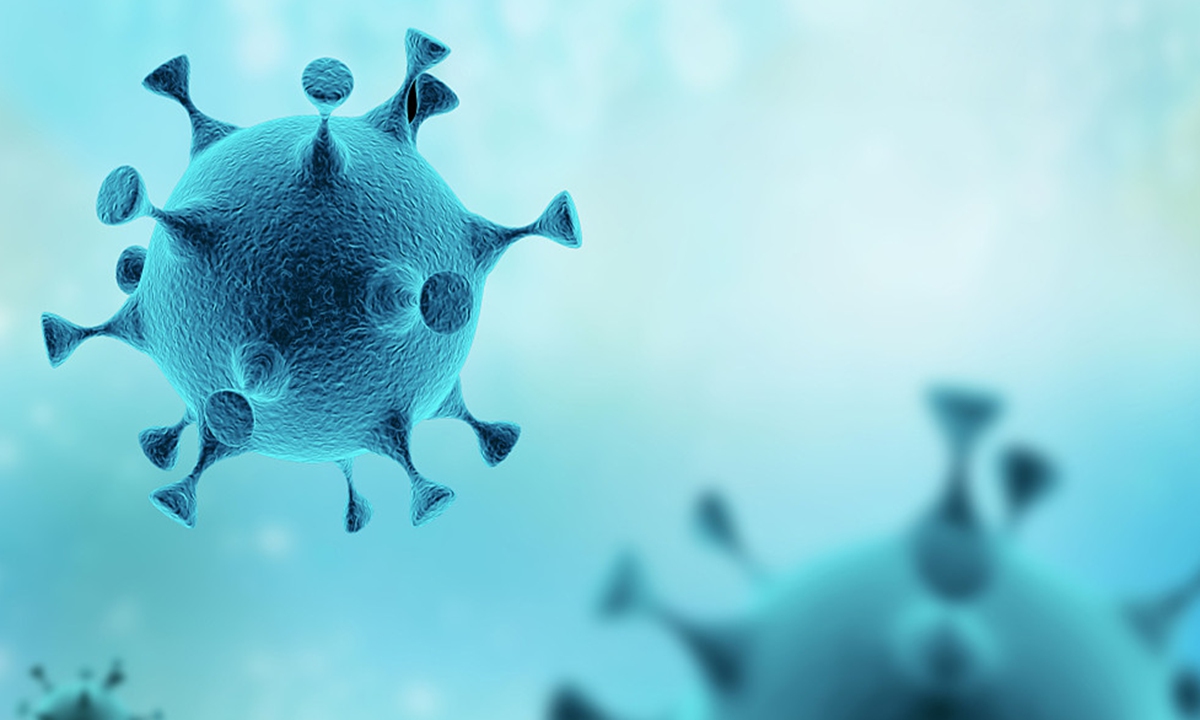
Coronavirus Photo: VCG
Despite some Western media and politicians out of political purpose continue to distort the scientific community's views on COVID-19 origins and exert political pressure on scientists, a growing number of scientists stepped forward and rejected the US-led "lab-leak" theory, with some scientists believing objective and scientific voices will be heard more widely which may prompt more objective reporting on COVID-19 origins in Western media.
In the most recent move, a group of 21 international scientists led by Professor Edward Holmes from the University of Sydney and Professor Andrew Rambaut from the University of Edinburgh said in a pre-print paper published on Wednesday that the mostly likely COVID-19 origin is zoonotic and there is zero evidence for a lab accident.
The review paper said that no evidence that the Wuhan Institute of Virology possessed or worked on a progenitor of SARS-CoV-2 prior to the pandemic, according to the University of Sydney.
David L Robertson, a professor at MRC-University of Glasgow Centre for Virus Research and one of the authors of the paper, told the Global Times on Thursday that the topic of COVID-19 origins has become "so politicalized," and "it is important to make sure the right investigations are prioritized, i.e., we follow the evidence to where it leads and don't get caught up scapegoating individuals or institutions based on hypothetical scenarios."
"There's been a lot of speculation in the media about the origins of SARS-CoV-2 so we decided to clearly lay out the scientific evidence," Robertson said.
He said hopefully by laying out the evidence in a clear and rationale way we can get this focused on the science.
Earlier this week,
24 international scientists published an open letter in The Lancet reiterating the natural origins hypothesis and their firm support to health professionals and scientists of China and the world, the same views they have been holding since they published their first joint letter in February 2020 in The Lancet, when the Trump administration attempted to smear, attack and stigmatize China on COVID-19.
The 24 scientists including Peter Daszak, a member of the WHO-led team studying the coronavirus' origins, said in the letter published on Monday that besides reaffirming solidarity with those in China who confronted the outbreak, they wanted to express their view on the most likely scenario that the SARS-CoV-2 originated in nature, not in a laboratory.
However, the open letter received very little publicity in the US and other Western press, which has been so strong on the lab-leak theory, a source close to the open letter in The Lancet told the Global Times on Wednesday, noting that things may begin to change with more scientists speaking out openly against the "lab-leak" theory.
Virologist Charles H Calisher, a professor at Colorado State University and one of the authors of two open letters in the Lancet, told the Global Times on Wednesday that so many media outlets and people misinterpreted and misunderstood what the scientists have said in their first letter, "although it was published in plain English," and "we felt it necessary to restate what we had said previously."
"We did not know the source of SARS-CoV-2 and neither did anyone else. Blaming the Chinese government and its scientists is reprehensible because there are no definitive data pointing to the source of this virus," Calisher said in an email sent to the Global Times.
Jeremy Farrar, director of Wellcome, a global charitable foundation which supports science to solve urgent health challenges, and the co-author of the letter, was quoted as saying in an email the foundation sent to the Global Times on Wednesday that "the origins of SARS-CoV-2 are not yet certain - it is possible the origin will never be fully established - but nature is a powerful force and, in my view, the most likely scenario is that the virus crossed from animals to humans and then evolved in humans. The best scientific evidence available to date points to this."
"There is no place for unsubstantiated rumors, or conspiracy theories often fueled for other purposes," Farrar was quoted as saying.
The right-wing press has been contacting authors of the first joint letter, one by one and repeatedly, in the last six months, pushing them to state whether they would change their stance. For example, the Daily Mail published pictures of all the scientists who had signed the first letter and said that some of the scientists changed their stance by believing in the "lab-leak" theory.
The US government is engaging in overt political manipulation, from discrediting China's anti-epidemic achievement to hyping the China "lab-leak" theory, from vilifying the authoritative WHO joint mission report to muffling scientists and experts upholding objectivity, from drawing on intelligence apparatus for an investigation to clamoring for a so-called independent investigation that excludes China.
Prominent US and Australian scientists focused on tracing the COVID-19 origins are now facing tremendous political pressure, and some have been sidelined for not yielding to politician-driven conspiracy theories, the Global Times recently learned from people with knowledge on the matter.
Such pressure will affect the next-phase scientific studies on the COVID-19 origins and reduce the efficiency of the world's scientific community, Calisher said.
Science works best in an environment of trust and respect, which permits objective and transparent collaboration, Gerald Keusch, a professor of medicine and international health at the Boston University Schools of Medicine and Public Health who signed the open letter, told the Global Times on Wednesday via email.
The re-confirmation from these authors in The Lancet is a statement that there is still strong support for scientists in China and around the world working on COVID-19 and that personal attacks will not change the facts of the issue - there is no evidence of a lab leak, the source said.




